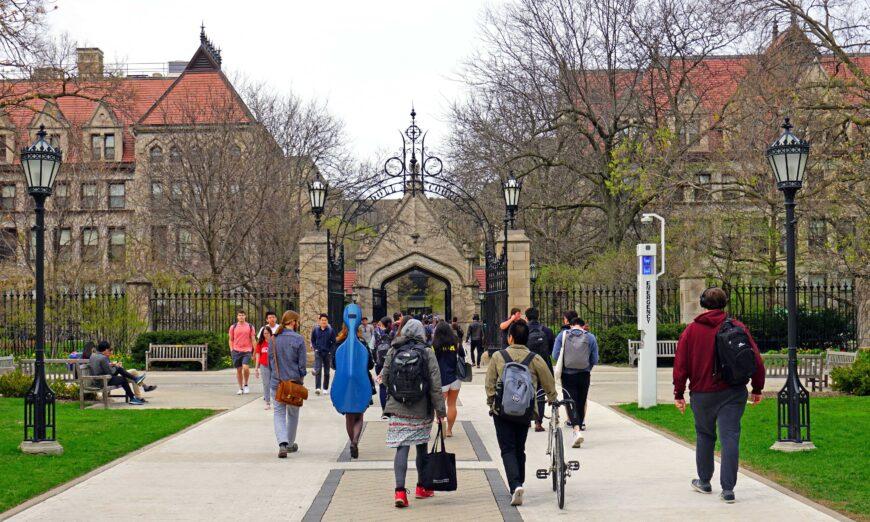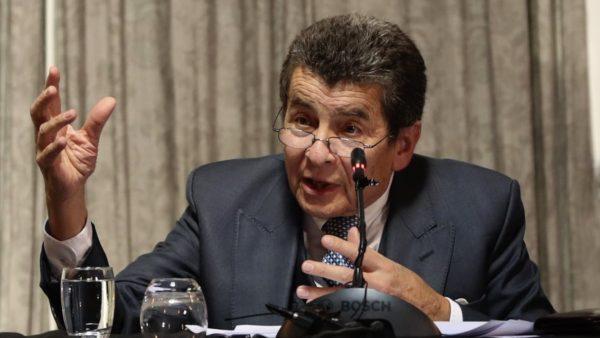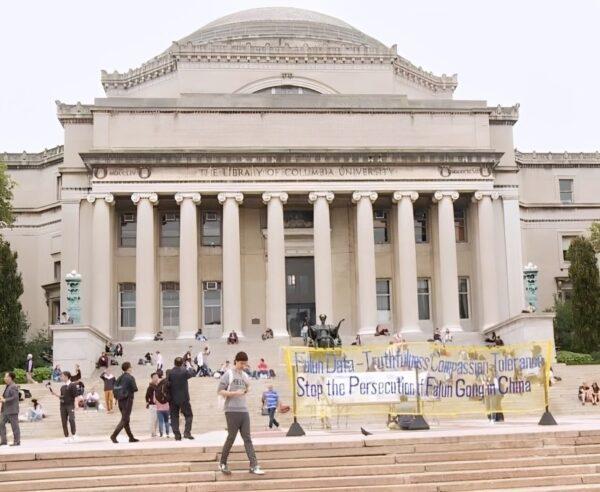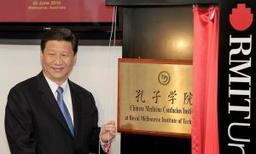
Students on the campus of the University of Chicago in Chicago, Ill., in a file photo. (EQRoy/Shutterstock)
Researchers warn against the Chinese regime’s efforts to “indoctrinate and spy” on students at U.S. universities, in an online webinar held on Aug. 17.
The event, hosted by the Washington-based think tank Hudson Institute, explored the Chinese Communist Party’s (CCP) “cognitive warfare” campaign, which aims to “promote CCP propaganda, spy on and intimidate Chinese exchange students, shape American views about the United States, and steal scientific, technological, and military research,” according to the webinar’s website.
The CCP’s strategies include forming bilateral ties between American colleges and Chinese universities, establishing consulate-linked Chinese student associations, and printing propaganda in textbooks used in U.S. college language courses.
“In a totalitarian country, whether it’s communist [or of] a different ideology, there's no real separation between civil society and the state,” said Ian Oxnevad, senior fellow for foreign affairs and security studies at the National Association of Scholars, who was a speaker at the event.
U.S. universities “may see themselves as partnering with benign, independent Chinese universities or student groups that—in the mind of the universities—are civil society,” he explained.
“But that's not the case on the Chinese side. These are extensions and proxies of the Chinese state. There's no real distinction between private and political life,” he added.
From Confucius Institutes to Bilateral Partnerships
According to Mr. Oxnevad, Confucius Institutes (CIs)—a Chinese language program attached to over 1,600 foreign universities and schools worldwide—constituted one phase of the CCP’s cognitive warfare.
CIs are funded by the CCP, which picks and pays for textbooks and selects and pays Chinese nationals who come to the United States to teach Chinese language, culture, and history. A 2018 report by the U.S.-China Economic and Security Review Commission said CIs had “longstanding and formal ties” to the CCP’s United Front Work Department, an agency responsible for coordinating the CCP’s influence operations.
“They erode intellectual freedom. Oftentimes, American campuses received [money] from China in order to host these Institutes, and the contracts involved are very opaque,” said Mr. Oxnevad.
He went on to explain that, due to pushback from professors, students, and policymakers, the CI's brand “became toxic,” which prompted Beijing to shut down and rebrand them.
Nowadays, “bilateral ties between Chinese universities and American universities are forming in different fields that are more specifically scientific oriented and other programs of that nature,” said Mr. Oxnevad.
Vulnerable Technologies
“Many schools in the U.S. are forming bilateral ties with Chinese universities that have military ties to the People's Liberation Army [PLA] in China. These, coincidentally, are American universities that have some sort of defense-related program or department involved,” he said.
Mr. Oxnevad mentioned Alfred University, where the Department of Defense funds hypersonic missile technology. The university reportedly has an ongoing research partnership with a China-based university that performs defense research for the CCP, as well as the continued housing of a Confucius Institute on its New York campus.
“Some of the same individuals involved in the engineering ceramics program at Alfred University were also tied to the Confucius Institute,” he said.
Prestige is the main motivation for U.S. colleges that partner with Chinese universities, according to Mr. Oxnevad.
“I've seen universities that have whole pages on their websites devoted to international programs … and they all happen to be in communist China,” he added.
That is “partly because other countries are not putting the efforts in to build these bilateral programs to the same degree that China is.”
Organ Harvesting
During the webinar, Nina Shea, senior fellow and director for the Center for Religious Freedom at Hudson Institute, pointed out that, while doing research on forced organ harvesting in China, she found that many U.S. medical schools and hospitals have contributed to the Chinese Transplant Center and participated in training about 344 Chinese transplant surgeons from China.
“And why did they do it? Why do they share the skills, and the knowledge, and funding in some cases? Well, a lot of it was to say that their universities were part of this global expanse of enlightenment or technology,” she said.
She mentioned this was very naive on the U.S. side as the knowledge transmitted would be of “dual use” given the CCP’s industrial-scale murder of prisoners of conscience for their organs.
Recently, the Association of American Physicians and Surgeons took a stance on organ harvesting in China, urging U.S. authorities and doctors to do what they can to stop enabling the abuse and calling on the U.S. government and American physicians to stop training or educating medical professionals from China—or any other totalitarian regime—in skills that could be used to commit the abuse.
The International Society for Heart and Lung Transplantation, the world's largest organization dedicated to researching end-stage heart and lung disease, stated in 2022 that it would no longer accept research papers "involving either organs or tissue from human donors in the People’s Republic of China" because of the body of evidence of the regime's systematic forced organ harvesting from nonconsenting donors.

In 2019, the China Tribunal—an independent expert panel chaired by international lawyer and former prosecutor in the Milosevic trial in The Hague Sir Geoffrey Nice KC—concluded that the Chinese regime has been committing forced organ harvesting from prisoners of conscience for years and on a substantial scale.
The tribunal also concluded that detained Falun Gong practitioners were likely the main source of such organs. Uyghurs and other persecuted minorities in northwest China are also at risk, along with Tibetans and House Christians, experts have said.
Falun Gong, also known as Falun Dafa, is a spiritual discipline involving meditative exercises and moral teachings based on three core principles: truthfulness, compassion, and tolerance. The communist regime has brutally persecuted the practice since July 1999; millions in China have been detained in prisons, labor camps, and other facilities, with hundreds of thousands tortured while incarcerated, according to the Falun Dafa Information Center.
Exporting Repression
Infiltration at American campuses has also enabled the CCP to commit transnational repression—a tool authoritarian regimes use to silence dissent overseas—according to Cynthia Sun, a researcher at the Falun Dafa Information Center, who was also a speaker at the event.
She mentioned a recent report by the Falun Dafa Information Center titled “Surveillance, Slander, and Censorship,” which surveyed dozens of university campuses across the United States with the presence of Falun Gong to examine how the Chinese regime's persecution is affecting adherents of the faith in the country.
According to Ms. Sun, Falun Gong adherents who host or participate in events to raise awareness on the over two-decade-long persecution—such as hosting film screenings, art exhibitions, or petition signing—face “a lot of reprisals.”
As adherents include second-generation Chinese or international students who still have family back in China, such reprisals often consist of harassment of their family members in China or threatening to harm them.
A fifth of the survey respondents said they felt somewhat or very uncomfortable self-identifying as a Falun Gong adherent or speaking about it in class due to such reprisals, she added.
“Through controlling activities of Falun Gong practitioners, Hong Kong activists, and other ethnic minorities in China, it's possible for them [the CCP] to also bring the surveillance, the slander, the censorship, to the United States of America,” said Ms. Sun.

One case occurred at the University of Pennsylvania (UPenn), said Ms. Sun, where the Falun Dafa club co-hosted a screening of the documentary “In the Name of Confucius,” which spotlights ties between Confucius Institutes and the Chinese regime. The case is also cited in Falun Dafa Information Center’s report.
After the event, over 79 students and graduates linked to the Chinese Students and Scholars Association (CSSA) sent complaints to the graduate student council, framing the event hosts as “anti-China” organizations, according to the report.
“They're supposedly a student organization for Chinese international students to come and celebrate their heritage and celebrate their common interests. And it's actually a proxy of the Chinese state,” she mentioned.
Supposedly created to help international students and promote cultural exchange, CSSAs form part of Beijing’s sprawling overseas influence activities run under the CCP's United Front Work Department. The party unit coordinates thousands of groups to carry out foreign political influence operations, suppress dissident movements, gather intelligence, and facilitate the transfer of U.S. technology to China, according to analysts.
Falun Dafa Information Center’s report found that survey respondents in at least nine universities faced or heard of interference with Falun Gong events; six of those cases involved the consulate-linked CSSA.
The CCP has also attempted to export its suppression of religions to U.S. soil by printing defamatory materials in the college textbook “Discussing Everything Chinese,” which echoes CCP propaganda, particularly misconceptions about Falun Gong, according to the report.
“It's seen as a reputable textbook, but it also has anti-American sentiment and also has misconceptions about AIDS, about different campaigns that the CCP is really focused on controlling the narrative around,” said Ms. Sun.
“It's just outrageous that that curriculum wasn't vetted, that it wasn't given a check by someone,” she added.
The report found that at least 10 universities—including Yale University, Brown University, the University of Chicago, the University of Michigan, and Wellesley College—use curriculum materials for a Chinese language course that contained defamatory propaganda about Falun Gong.
A Legal Solution
According to Mr. Oxnevad, repelling China’s “cognitive warfare” will require federal and state legislation since “administrators at universities may have no background in geopolitical or international business affairs."
"Sometimes they simply turn a blind eye to it,” he added.
He mentioned “ratio funding”—which ties eligibility or ineligibility for taxpayer funding to the extent of funding from any foreign entity—as a possible solution.
“There's a desire for openness that is in direct tension with the risks that that openness poses in terms of allowing inflows from totalitarian countries to university campuses. And that's something that has to change in terms of how our university system is managed and regulated,” he said.


No comments:
Post a Comment